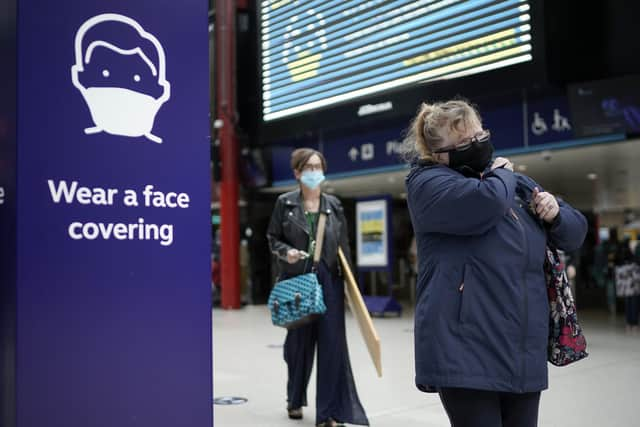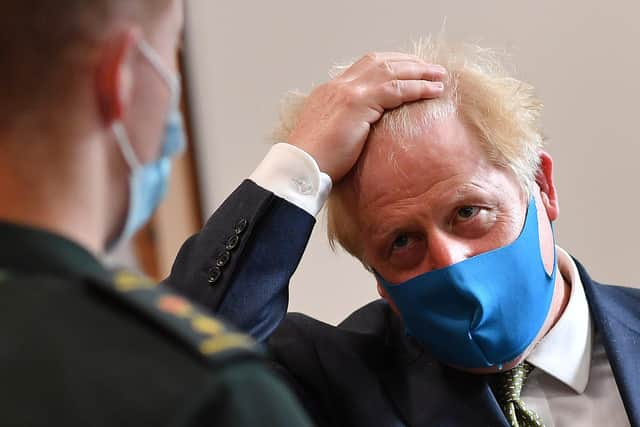Facemask Friday won’t get people back to our deserted city centres: Andrew Vine
Nobody around at lunchtime, popping out to buy a sandwich or a coffee and only a trickle of people getting off buses as they head for work.
We can’t go on like this if an economic catastrophe is to be avoided later in the year, with the crunch coming in October when Government support for jobs ends, and goodness knows how many people are destined to swap being furloughed for unemployment.
Advertisement
Hide AdAdvertisement
Hide AdBut the messages coming from the Government are so confused and contradictory that it’s impossible to have faith in its ability to stave off a tsunami of joblessness by getting people back into their offices.


If there needed to be an emblem for the muddled thinking and lack of grip on steering Britain out of this crisis, it has to be the face masks that we’re all obliged to wear in shops from Friday.
The delay between the announcement of this and its introduction is little short of farcical if, as claimed, it is a vital step in keeping people safe.
Common sense surely tells us that the instruction to cover our faces comes weeks too late, and begs the question why it was not introduced at the same time as on public transport.
Advertisement
Hide AdAdvertisement
Hide AdThe contradictions in policy are simply absurd. On Friday, for my regular 20-minute zip round the supermarket for the weekly shop, I shall have to cover my face on the grounds that I’m in an environment which is full of strangers who might have coronavirus, or who might catch it from me.


Afterwards, I can remove the mask and choose to go directly to a pub, to sit in an environment full of strangers for however long I like, none of whom are required to have their faces covered. Then I could opt for a leisurely meal out, amid yet more strangers without masks, and I’d be following Government urgings for us all to get back out to pubs and restaurants by doing so.
Where’s the consistency in this? None of the science I’ve seen suggests that a relatively brief visit to the shops presents a greater risk than being in a pub or restaurant for hours on end.
There’s a whiff of tokenism about the introduction of masks, and far from encouraging people to start going about their lives with greater confidence, it risks frightening them more than they already are.
Advertisement
Hide AdAdvertisement
Hide AdIt wouldn’t be any surprise to see a further spike in the amount of shopping done online from Friday, as people decide to stay away from stores, not only because they’re newly afraid of catching Covid but because they feel sweaty and claustrophobic having their face covered.
And that could edge more shops yet closer to going bust.
We need clarity and a sense of direction from the Government, but all we’re getting is mixed messages.
In the latest of his increasingly incoherent addresses to the nation, Boris Johnson urged people to start using public transport again, and return to their places of work, because the message to stay at home had outlived its usefulness.
Yet just days before, his chief scientific adviser, Sir Patrick Vallance, had told MPs that people were still safer working from home. Who to believe?
Advertisement
Hide AdAdvertisement
Hide AdFrom the outside, it feels at best that those responsible for managing Britain’s response to the pandemic aren’t communicating with each other. Or, at worst, that they don’t know what they’re doing.
For all the combined brainpower in Government, it doesn’t seem to have occurred to anyone that its increasingly dire warnings of a second spike as autumn wears into winter is the most powerful argument for offices remaining empty, despite the Prime Minister’s exhortations to the contrary.
If there is an upsurge in cases, the best place for employees to be is at home and separated from their colleagues, not all crowded together, whether in masks or not.
Any responsible employer would view that as the most sensible course, both for the sake of their staff’s health and that of society, by doing their bit to minimise the spread of Covid.
Advertisement
Hide AdAdvertisement
Hide AdUnless there is a much greater sense that the Government has a clearly thought-out strategy on managing Britain’s course out of the pandemic, there won’t be any mass return to workplaces, and no revival of our town and city centres.
Employers quite rightly won’t risk it, especially if keeping staff working from home hasn’t had too great an impact on the efficiency of their businesses.
Boris Johnson has to do much more to persuade Britain to resume a normal working life. His claim that goal is in sight by Christmas just doesn’t ring true.
Editor’s note: first and foremost - and rarely have I written down these words with more sincerity - I hope this finds you well.
Advertisement
Hide AdAdvertisement
Hide AdAlmost certainly you are here because you value the quality and the integrity of the journalism produced by The Yorkshire Post’s journalists - almost all of which live alongside you in Yorkshire, spending the wages they earn with Yorkshire businesses - who last year took this title to the industry watchdog’s Most Trusted Newspaper in Britain accolade.
And that is why I must make an urgent request of you: as advertising revenue declines, your support becomes evermore crucial to the maintenance of the journalistic standards expected of The Yorkshire Post. If you can, safely, please buy a paper or take up a subscription. We want to continue to make you proud of Yorkshire’s National Newspaper but we are going to need your help.
Postal subscription copies can be ordered by calling 0330 4030066 or by emailing [email protected]. Vouchers, to be exchanged at retail sales outlets - our newsagents need you, too - can be subscribed to by contacting subscriptions on 0330 1235950 or by visiting www.localsubsplus.co.uk where you should select The Yorkshire Post from the list of titles available.
If you want to help right now, download our tablet app from the App / Play Stores. Every contribution you make helps to provide this county with the best regional journalism in the country.
Sincerely. Thank you.
James Mitchinson
Comment Guidelines
National World encourages reader discussion on our stories. User feedback, insights and back-and-forth exchanges add a rich layer of context to reporting. Please review our Community Guidelines before commenting.